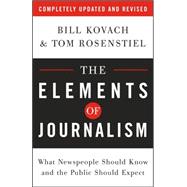
Note: Supplemental materials are not guaranteed with Rental or Used book purchases.
Purchase Benefits
What is included with this book?
| Preface to the New Edition | p. ix |
| Introduction | p. 1 |
| What Is Journalism For? | p. 9 |
| Truth: The First and Most Confusing Principle | p. 35 |
| Who Journalists Work For | p. 51 |
| Journalism of Verification | p. 78 |
| Independence from Faction | p. 113 |
| Monitor Power and Offer Voice to the Voiceless | p. 139 |
| Journalism As a Public Forum | p. 162 |
| Engagement and Relevance | p. 186 |
| Make the News Comprehensive and Proportional | p. 207 |
| Journalists Have a Responsibility to Conscience | p. 226 |
| The Rights and Responsibilities of Citizens | p. 245 |
| Acknowledgments | p. 257 |
| Index | p. 259 |
| Table of Contents provided by Ingram. All Rights Reserved. |
The New copy of this book will include any supplemental materials advertised. Please check the title of the book to determine if it should include any access cards, study guides, lab manuals, CDs, etc.
The Used, Rental and eBook copies of this book are not guaranteed to include any supplemental materials. Typically, only the book itself is included. This is true even if the title states it includes any access cards, study guides, lab manuals, CDs, etc.
Excerpted from The Elements of Journalism: What Newspeople Should Know and the Public Should Expect by Bill Kovach, Tom Rosenstiel
All rights reserved by the original copyright owners. Excerpts are provided for display purposes only and may not be reproduced, reprinted or distributed without the written permission of the publisher.